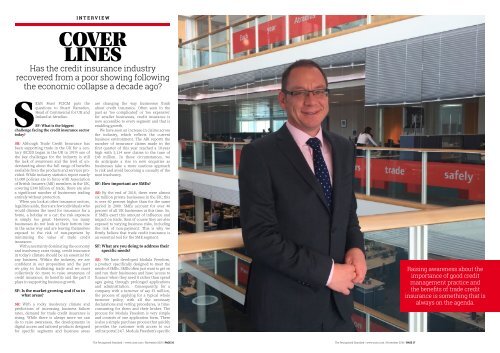CM November 2019 atradius
Create successful ePaper yourself
Turn your PDF publications into a flip-book with our unique Google optimized e-Paper software.
INTERVIEW<br />
COVER<br />
LINES<br />
Has the credit insurance industry<br />
recovered from a poor showing following<br />
the economic collapse a decade ago?<br />
SEAN Feast FCI<strong>CM</strong> puts the<br />
questions to Stuart Ramsden,<br />
Head of Commercial for UK and<br />
Ireland at Atradius.<br />
SF: What is the biggest<br />
challenge facing the credit insurance sector<br />
today?<br />
SR: Although Trade Credit Insurance has<br />
been supporting trade in the UK for a century<br />
(ECGD began in the UK in 1919) one of<br />
the key challenges for the industry is still<br />
the lack of awareness and the level of understanding<br />
about the full range of benefits<br />
available from the products and services provided.<br />
While industry statistics report nearly<br />
13,000 policies are in force with Association<br />
of British Insurers (ABI) members in the UK,<br />
covering £340 billion of trade, there are also<br />
a significant number of businesses trading<br />
entirely without protection.<br />
When you look at other insurance sectors,<br />
legalities aside, there are few individuals who<br />
would dismiss the need for insurance for a<br />
home, a holiday or a car; the risk exposure<br />
is simply too great. However, too many<br />
businesses do not look at their bottom line<br />
in the same way and are leaving themselves<br />
exposed to the risk of non-payment by<br />
minimising the value of trade credit<br />
insurance.<br />
With uncertainty dominating the economy<br />
and insolvency rates rising, credit insurance<br />
in today’s climate should be an essential for<br />
any business. Within the industry, we are<br />
confident in our proposition and the part<br />
we play in facilitating trade and we must<br />
collectively do more to raise awareness of<br />
credit insurance, its benefits and the part it<br />
plays in supporting business growth.<br />
SF: Is the market growing and if so in<br />
what areas?<br />
SR: With a rocky insolvency climate and<br />
predictions of increasing business failure<br />
rates, demand for trade credit insurance is<br />
rising. While there is always more we can<br />
do to raise awareness, the developments in<br />
digital access and tailored products designed<br />
for specific segments and business areas<br />
are changing the way businesses think<br />
about credit insurance. Often seen in the<br />
past as ‘too complicated’ or ‘too expensive’<br />
for smaller businesses, credit insurance is<br />
now accessible to every segment and that is<br />
enabling growth.<br />
We have seen an increase in claims across<br />
the industry, which reflects the current<br />
business environment. The ABI reports the<br />
number of insurance claims made in the<br />
first quarter of this year reached a 10-year<br />
high with 5,114 new claims to the tune of<br />
£48 million. In these circumstances, we<br />
do anticipate a rise in new enquiries as<br />
businesses take a more cautious approach<br />
to risk and avoid becoming a casualty of the<br />
next insolvency.<br />
SF: How important are SMEs?<br />
SR: By the end of 2018, there were almost<br />
six million private businesses in the UK; this<br />
is over 60 percent higher than for the same<br />
period in 2000. SMEs account for over 40<br />
percent of all UK businesses at this time. So,<br />
if SMEs exert this amount of influence and<br />
impact on trade, then of course they are also<br />
exposed to varying business risks, including<br />
the risk of non-payment. This is why we<br />
firmly believe that trade credit insurance is<br />
an essential tool for the SME segment.<br />
SF: What are you doing to address their<br />
specific needs?<br />
SR: We have developed Modula Freedom,<br />
a product specifically designed to meet the<br />
needs of SMEs. SMEs often just want to get on<br />
and run their businesses and have ‘access to<br />
finance’ when they need it rather than spend<br />
ages going through prolonged applications<br />
and administration. Consequently, for a<br />
company with a turnover of say £3 million,<br />
the process of applying for a typical whole<br />
turnover policy, with all the necessary<br />
declarations and vetting procedures, is timeconsuming<br />
for them and their broker. The<br />
process for Modula Freedom is very simple<br />
and consists of one application form. There<br />
is also a simple purchase process that quickly<br />
provides the customer with access to our<br />
online portal 24/7. Modula Freedom’s specific<br />
Raising awareness about the<br />
importance of good credit<br />
management practice and<br />
the benefits of trade credit<br />
insurance is something that is<br />
always on the agenda.<br />
The Recognised Standard / www.cicm.com / <strong>November</strong> <strong>2019</strong> / PAGE 16<br />
The Recognised Standard / www.cicm.com / <strong>November</strong> <strong>2019</strong> / PAGE 17
INTERVIEW<br />
AUTHOR – Sean Feast FCI<strong>CM</strong><br />
features include first orders cover giving<br />
customers more flexibility and opportunities<br />
to grow their sales with the protection of<br />
Atradius. Customers can also choose the level<br />
of maximum liability required from several<br />
options.<br />
SF: What other new products/<br />
innovations have you recently<br />
launched?<br />
SR: The industry is constantly evolving<br />
and as the way trade transactions<br />
take place changes, so we too, continue<br />
to adapt to a more digital world.<br />
Atradius Atrium is our digital platform that<br />
enables our customers (and brokers) to communicate<br />
with us on every aspect of their<br />
policy through one single login – and as you<br />
would expect it is available not just ‘on the<br />
go’ but 24/7. But as important as it is to have<br />
a digital capability there is still a real value in<br />
human interaction and we take pride in not<br />
just our customer service proposition, but the<br />
strong relationships that we build with customers,<br />
brokers and industry in general. For<br />
example, our Risk Underwriting approach revolves<br />
around knowing the market and trade<br />
sector and our Underwriters work closely with<br />
businesses to ensure that the business information<br />
that decisions are based on is current,<br />
and relevant at all times.<br />
SF: Have the lessons of the past been<br />
learned?<br />
SR: The severity and ferocity of the financial<br />
crisis of 2008/9 and the sheer number of<br />
firms falling victim to insolvency during that<br />
period make it stand out as an extreme event<br />
in history – there were lessons to be learned<br />
for everyone. The world has changed in the 10<br />
years since the crash and more sophisticated<br />
financial management strategies alongside<br />
fiscal regulation now create a very different<br />
environment.<br />
The approach to buyer risk underwriting<br />
has also seen changes. Accurate and up-todate<br />
information is critical as the crisis proved<br />
it was no longer enough to rely on annual<br />
reports or aged accounts. Understanding<br />
the strategic direction of a business as well<br />
as analysing their financial strength is<br />
critical. Our underwriters have built up close<br />
relationships with most key players within the<br />
industry, enabling informed insight into trends<br />
and developments and individual payment<br />
behaviour. We always advise businesses to be<br />
open and transparent with us. We operate an<br />
open-door policy and are proactive in seeking<br />
information to enable us to make informed<br />
credit decisions in support of our customers.<br />
Early warning of a deteriorating risk and<br />
loss mitigation action is essential to protect<br />
against the loss to a customer’s income. It is<br />
important to understand that insurance protects<br />
the majority percentage of monies owed,<br />
but it is industry standard practice for the insured<br />
to carry an uninsured percentage (usually<br />
10 percent) of the debt. One of the reasons<br />
why customers insure in the first place is to<br />
ensure that they trade with businesses that<br />
are strong enough to support credit terms.<br />
If their potential customer is a poor risk,<br />
they want to know that upfront so that they<br />
can make informed decisions. When a risk<br />
deteriorates it is important for all stakeholders<br />
to be aware of what is happening, and<br />
when the risk of non-payment increases significantly<br />
it is appropriate to review the cover<br />
arrangements with our customers – being<br />
alerted to a probable default is a warning that<br />
any supplier would want to receive.<br />
SF: What more could credit insurers<br />
do to educate businesses/credit<br />
managers?<br />
SR: Raising awareness about the importance<br />
of good credit management practice and the<br />
benefits of trade credit insurance is something<br />
that is always on the agenda. The ABI has<br />
done a great deal to help create awareness<br />
and has also supported the key providers<br />
in an initiative to work together from a PR<br />
perspective.<br />
We constantly seek out opportunities to<br />
talk about trade credit insurance and share<br />
our expertise with businesses whether<br />
through publications, events, networking,<br />
speaker opportunities as well as media<br />
segments and of course social channels. In<br />
an uncertain economic environment, there is<br />
a prime opportunity for insurers and brokers<br />
to work collaboratively to demonstrate the<br />
value of trade credit insurance to businesses<br />
both in terms of its ability to protect from<br />
non-payment and through its role as a trade<br />
partner in developing robust trade strategies<br />
to seek out new opportunities and mitigate<br />
risk.<br />
Business growth and trade credit insurance<br />
are intrinsically interlinked and, as the<br />
insurer, we need to be involved well ahead<br />
of a contract or new trade relationship being<br />
agreed. It is also important to remember that<br />
education is not one-way. As insurers we are<br />
also learning all the time – listening is key!<br />
We have strong relationships with all of our<br />
stakeholders, which helps us to stay ahead of<br />
the curve in an ever-changing marketplace.<br />
The Recognised Standard / www.cicm.com / <strong>November</strong> <strong>2019</strong> / PAGE 18<br />
The Recognised Standard / www.cicm.com / <strong>November</strong> <strong>2019</strong> / PAGE 19


















